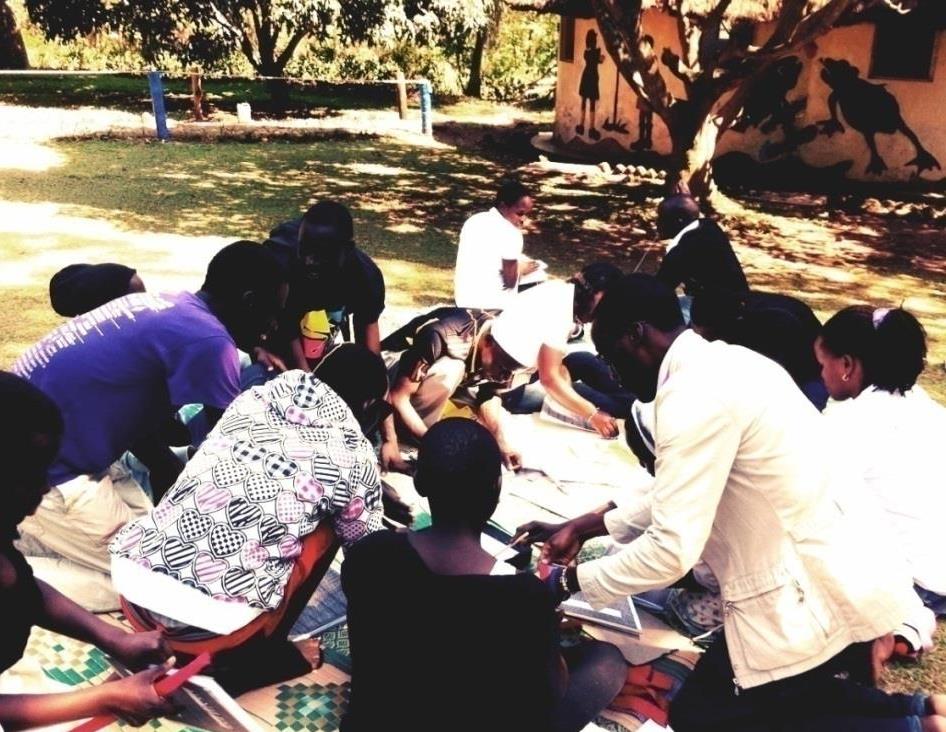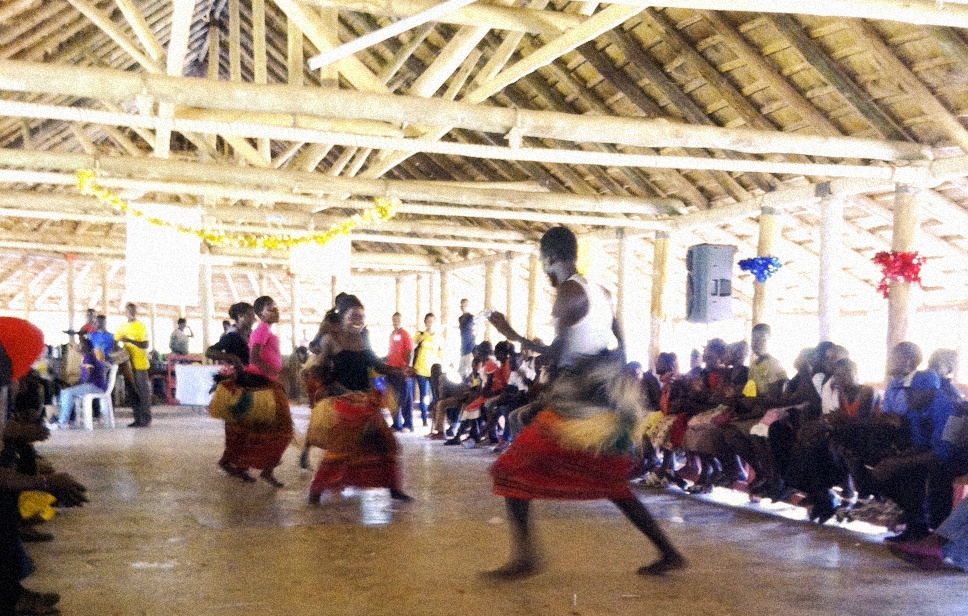I am walking around aimlessly, watching 128 teenagers joke and flirt with each other and feeling entirely out of place. The teenagers are sitting on blankets spread out on the grass, laughing and chatting as they work diligently on the project of the day: constructing handmade school books that they will use for lessons and homework for the upcoming year. As they paste photocopied papers onto cardboard covers and thread the blank pages together, I wander around and lamely attempt to compliment them on their work. Some thank me politely; others are deep in concentration and barely look up. I wonder what I am doing there.
Earlier that week, one of Baylor-Uganda’s counselors had invited me to participate in the annual Power of Hope camp, a weeklong day camp for HIV-positive young adults aged 13 to 18. The camp is geared towards clients who are not adhering to their antiretroviral drugs—adherence is a major issue for this age group, which struggles with stigma, anger and defiance about their HIV status, fear of being exposed to their friends, and unstable home situations that prevent them from following routines. The counselor had invited me to be part of an “ask an adult” Q&A session in which the campers asked Baylor staffers for advice, guidance, and general adult wisdom. It seemed like a great opportunity for me to get to know some of Baylor’s clients, and I gladly accepted.
Once I arrived at camp for the morning Q&A session, I was informed that the schedule had changed and it wouldn’t be happening until the afternoon. It was up to me to figure out how to pass the time in between. So, for a good part of the morning, I watched the various activities taking place and wished I had something to do. I didn’t want to get in the way of the other staffers, who actually had work to do. I couldn’t join the bookbinding activity; that project had started days ago and the campers were almost finished. More significantly, I didn’t want to intrude. Here is a group of young people, I thought, gathered together to address the most personal and difficult aspects of their lives, and here I am, a white stranger peering in on them. After the many conversations at GHC training about misguided good intentions and poverty tourism and the paternalism of aid, I already felt conflicted about my presence in Uganda in the first place. The last thing that I wanted to do was impose myself on the campers, who already had enough to deal with.
As I berate myself for being there, the Nigerian rap song that signals the change in activities blares over the speakers. The teenagers pack up their notebook-making materials and congregate into three groups. Game time is next. Traditional sports aren’t allowed at camp, since they create winners and losers; instead, there are inclusive games that promote physical activity and cooperation. The three groups start to play three different games that seem to involve a lot of running around and shouting. I watch from a distance for a few minutes until one of the counselors comes over and asks me why I’m not participating. I’m a little surprised; I’m there as an official “adult” representative, after all. I insist that I’m happy observing and explain that I don’t want to impose. She counters that I am imposing more by just standing there and directs me to get involved, steering me towards one of the three groups. I have no choice but to swallow my self-consciousness and comply.
I walk hesitantly towards a group standing in a large circle. Two girls move apart to let me join. They don’t stare at me questioningly like I thought they might; instead, they smile and bring me up to speed on the rules of the game. It doesn’t take long to pick them up: a person in the middle tries to roll a ball between the others’ legs. If the ball comes to you, you try to catch it before it rolls through your legs. If it gets through, you have to chase after it; laughter ensues. The stakes seem pretty low. I think this is something I can handle.
—
An hour later, I am sweaty and laughing and my feelings of self-doubt have evaporated. I have played all three of the games and have become a self-declared expert in one. I have frantically linked arms with just about every camper, trying to avoid getting tagged. I have run as fast as I could (read: not very fast) to try in vain to tag someone. I feel welcomed and at ease; the campers are obviously too busy having fun to be suspicious of my presence. The rest of the day is great: l chat with the campers, share lunch with the counselors, and watch a spontaneous traditional dance performance. I participate in the Q&A session, even though I can’t answer any of the questions, most of which are grievances about camp itself: Why isn’t it an overnight camp? (Lack of funds.) Why can’t our friends from other HIV/AIDS organizations participate? (Lack of capacity.) Why can’t we go swimming? (Liability issues.) At the end of the day, I am given a t-shirt and a handmade beaded bracelet and, most importantly, a sense of belonging. What am I doing here? I still don’t entirely know—but at least I know that here is where I want to be.


